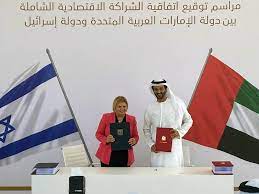The UAE and Israel’s economic ties took an important turn as they signed the final part of the Free Trade Agreement (FTA) in March 2023. The customs pact was signed by Foreign Minister Eli Cohen and UAE Ambassador Mohamed al-Khaja in Jerusalem, with Israeli PM Benjamin Netanyahu present. The Israel-UAE Comprehensive Economic Partnership Agreement was signed in May 2022 but was only applicable after the final agreement was signed in March 2023.
The agreement aims to lower or eliminate tariffs on more than 96 percent of tariff lines and 99% of the value of trade between the two countries. The discussion to make both parties satisfied took a while as each product was reviewed to determine what could be recovered. The agreement has come into force on April 1, 2023. The Israeli PM applauded the agreement and stated that it would bring about reductions in customs, bring down the cost of living, and develop economic relations between the two countries.
The extensive agreement covers regulation, customs, services, government, procurement, e-commerce, and the protection of intellectual property rights. 96% of the products traded between the countries, including food, agriculture, cosmetics, medical equipment, and medication, will be exempt from customs duty.
Israel and UAE relations were not always collaborative, but since 2010, the countries relations have improved considerably and developed trust. Both countries started their unofficial cooperation based on their joint opposition to Iran’s nuclear program and regional influence. In 2015, Israel opened an official diplomatic mission in Abu Dhabi. In September 2020, Israel and the UAE officially normalised their relations and also halted their plan to annex parts of the West Bank as part of the US-brokered deal. In 2020, the Abraham Accords further normalised the relations between the two countries, fostering greater political, economic, and regional security integration in the Middle East. This has enabled high-level, open diplomatic ties, commercial opportunities, technology transfers, and dialogue on regional security issues. Credit also goes to economic, soft, and hard power exchanges, which have offered long-term and short-term benefits to both countries. Through a variety of bilateral and multilateral initiatives, including the Baghdad summits, the March 2022 Negev meeting, and the Israel-Lebanon Maritime Agreement, normalisation has promoted higher levels of regional participation, conflict de-escalation, and diplomatic reconciliation. As part of the CENTCOM-led goal of developing an integrated regional security construct, an incremental procedure has been developed that may foster confidence and defence cooperation throughout the region.









